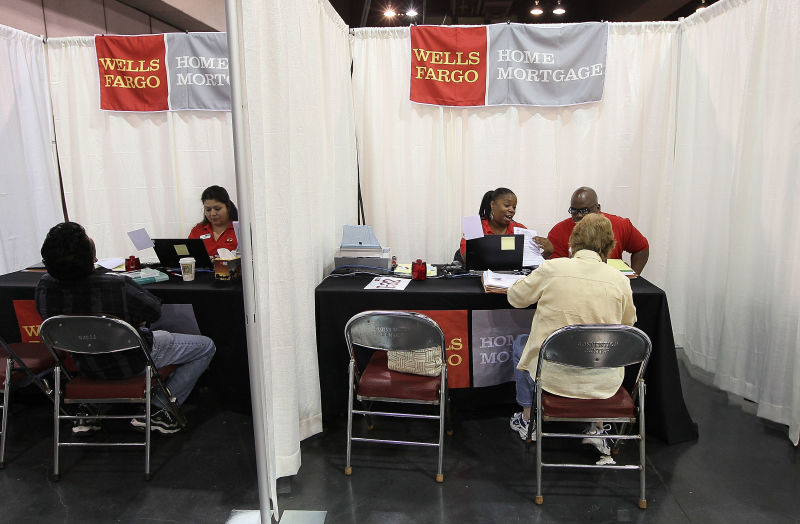The bank vehemently denies the claims. Wells Fargo spokesman, Ruben Pulido, sent this email to KQED:
"The City Attorney’s accusations against Wells Fargo do not reflect how we operate in the communities where we do business and it’s disappointing that she has chosen this course of action over a collaborative approach to helping borrowers and home owners in Oakland. Wells Fargo has been a part of the Oakland community for more than 140 years and we will vigorously defend our record as a fair and responsible lender. We will continue to focus on helping customers in Oakland and its surrounding communities succeed financially, and on expanding homeownership in California and across the United States."
Christopher Palmer, of the UC Berkeley Haas School of Business, says there's no doubt the housing crisis hit minorities hard.
"Subprime lending was much more prevalent among blacks and Hispanics," Palmer says. "That's just a fact that just jumps out of the data."
But the data on their own don't necessarily mean the city can prove there was an abusive pattern that violated fair housing laws, according to Palmer. However, while proving these cases can be difficult, there have been a number of lawsuits filed against banks in recent years, including some by the Department of Justice, that have resulted in hefty settlements. In a very similar case in Baltimore in 2012, Wells Fargo settled with the U.S. Department of Justice for more than $175 million.
Those settlements, Parker says, are part of the reason Oakland is joining with other cities — including Los Angeles -- in taking on Wells Fargo.
Kevin Stein, with the advocacy group California Reinvestment Coalition, says that in many ways cities are turning to the courts as a last resort.
"I think local governments, local jurisdictions, have been trying to deal with the crisis, because they see it had not been dealt with at the federal and state level sufficiently," Stein says.
The foreclosure crisis hit cities like Oakland directly in their pocketbooks, Parker says, leaving the city — and the state — with a large gap in property tax revenues.
Stein says cities like Oakland are caught in a bind — they are the places that feel the full weight of the housing crisis, yet they have no way to regulate or hold banks accountable. Not for lack of trying, according to Stein.
Back in 2001, Oakland passed an anti-predatory lending ordinance. "That ordinance," Stein says, "would have restricted abusive lending practices. And if laws like that were in place throughout all of the cities in California, then we would not have had the crisis that we ultimately had."
But the law was challenged by the banking industry — and the California Supreme Court eventually overturned the rule, saying that the city did not have the authority to regulate banks in that way.
Oakland isn't the only city that has tried to deal with the foreclosure crisis itself. Last year Richmond floated the idea of using eminent domain to take back foreclosed and blighted houses.
Wells Fargo blocked that move with a lawsuit -- which Stein says basically amounted to a threat.
"In a way what they were arguing was the city of Richmond shouldn't be allowed to implement an eminent domain program, because the result of that would be that banks wouldn't lend in the city of Richmond," Stein says. "Which is another way of saying, if you proceed with eminent domain, which we don't like -- we will redline your city.
"Which," Stein adds, "is outrageous."
Redlining is a practice, often thought of as in the past, that in effect cut off certain neighborhoods from receiving loans. And yes, those neighborhoods were largely populated by African-Americans.
If redlining were a form of starving certain neighborhoods for credit, so-called predatory lending  acted as a sort of reverse redlining, Stein says.
acted as a sort of reverse redlining, Stein says.
"Neighborhoods that had been deprived of conventional low-cost credit were flooded with the opposite, with the converse, just before the crisis and have suffered as a result," he says.
And now, Stein says, banks may be redlining again. "In a way we've kind of come full circle," he says. "What we're seeing now is kind of a return to redlining. In the best possible light, lenders are being more conservative in making loans."
But some cases in the courts claim something more nefarious than the pendulum swinging back from over-lending, including a recent case in New York, and a case settled in 2001 in Michigan. The number of these redlining cases is growing.
Although Stein is critical of Wells Fargo, he says it seems to have done good work in Oakland since the 2008 housing market collapse.
"I feel compelled to say that my understanding was that Wells was a decent partner, that some people in the city felt Wells was playing some constructive role," Stein says.
